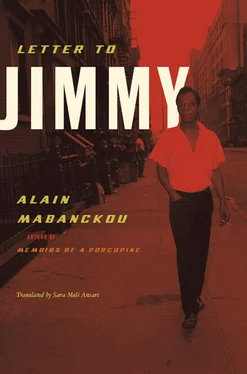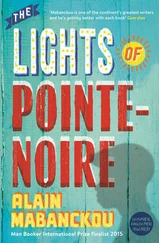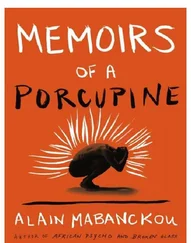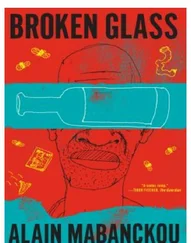In some respects, I would say that the black community in France is an illusion, that it does not exist, for the plain and simple reason that the existence of a community is an intellectual and historical construct. The existence of a so-called black community in France would presuppose a collective awareness of it, and I am referring to an awareness based on reasons beyond skin color, or belonging to the same continent, or to the more broadly defined black diaspora, which, more and more, proclaims its singularity, its “rhizomic identity,” as Édouard Glissant would say.
It is through the present, through encounters, that this common identity is woven; sometimes we can even find ourselves surprised by how much it conflicts with the idea of a “primary root” that would lead us all back to a single past. This other awareness — that black Americans have been able to develop throughout their long and troubled history — this other awareness, as I was saying, should take into account the experience lived out on French soil. The effect outrage has as a response to an injustice depends on a collective cause, which is given greater value than the individual in an abstract sense, and is related to our humanity. In this way, when we are witness to an act of racism, when we witness an act of anti-Semitism, it is our sense of humanity that sustains injury.
•••
Jimmy, citizens of black Africa are convinced that African-Americans today have succeeded in creating a community whose influence is so far-reaching that it affects the destiny of the entire United States. And so, when confronted with an attitude that is unjust, with an act of racism or discrimination, black Africans automatically ask themselves, “So what would our black American brothers have done in this exact situation?” Is it surprising then that certain observers are alarmed to see “racist,” Black Muslim ideas imported into France?
Whatever the case may be, the comparison with the black American community is further corrupted by the fact that blacks in France do not have the same experience of migration, and that they do not have the same “score” to settle with France as black Americans do. On the other side of the Atlantic, racial segregation was institutionalized — France, on the other hand, played a significant role in “the elaboration of the ‘African experience’ in the formulation and reformulation of a global blackness,” 122thanks to the diversity of the black migrations that it experienced and still continues to experience today.
Blacks in France can certainly draw inspiration from their American black brothers, and envy the rights they have achieved in the United-States — however, let us be reminded, with the help of Fanon, that every right was wrested from fierce struggle that ended with the United States painted into a corner. From these struggles great leaders were born and immortalized in contemporary American history. What these black leaders shared in common was that they refused to have their humanity called into question.
It is Fanon who emphatically highlights: “No, I do not have the right to come scream my hatred at the White man. I do not have a duty to murmur my gratitude to the White man. . if the White man questions my humanity, I will show him, weighing down on his life with all my force as a man, that I am not the “Y’a bon Banania” that he insists on imagining. .” 123
9. the ghost of Saint-Paul-de-Vence
As the summer of ’86 begins, the specter of death looms over Saint-Paul-de-Vence.
You withdraw to the back of a room, near an old fireplace; shut away from the world, you stretch yourself out on a mattress on the floor, pushing away the inexorable verdict with an authoritative hand, although the hand is weaker than in the days when your power as a civil rights activist and your finesse as an essayist made all of America tremble.
Until your last day, until your last breath, you hammer away at the keys of your typewriter, as if to engrave your final wishes, to write the sentence with which posterity would remember the name, that would perhaps utter nothing more: James Baldwin. .
Unmoved by your work ethic and blind to beauty, Death comes to Saint-Paul-de-Vence in 1987. She spends no time contemplating the splendor of the ramparts, turns her back on the hills, the Mediterranean and the Esterel Massif. She arrives by way of the old village cemetery without slowing down, because this time she does not plan to miss you. Death knows you, but only from afar; perhaps she is unable to face your big eyes that would have studied her from head to toe.
If on that night you had gotten up, if you had gone to the window and opened it, you might have seen the bad omens: the awkward flight of lost passerines, the cawing of crows troubled by the blanket of black covering the sky for weeks. You might have noticed the passing shadows of the artists who earned Saint-Paul-de-Vence its reputation. Why do they linger in the famous hotel, Le Robinson, surprised that it is now called La Colombe d’Or? The walls of the Colombe d’Or are decorated with the paintings and drawings of Braque, Picasso and Matisse. Who could help but smile when hearing that it was with these that the artists paid the restaurant? No matter — these souls have wandered over to La Pergola and La Résidence. There again they discover a new name: Café de la Place. From your window you could have waved at these illustrious friends. Matisse, Chagall, Renoir, and Modigliani would have been the first to wave back to you. Then Cocteau and Prévert, followed closely by the film people, Cayette and Audiard. The latter would have called out to you, as a consolation against your imminent death, “The ideal thing, when one wants to be admired, is to be dead.” And to make you laugh, he would have thrown in one of the sayings that made him famous: “The French irritate me immensely, but as I speak no other language, I am obliged to talk with them.”
The musicians — I am thinking of Armstrong and Miles — would play a piece that would rouse the Provençal countryside. And yes, Bessie Smith’s voice would be there, too. She would sing out in a clear voice a strain from “Back Water Blues.” Once more you would be moved by this woman who sang about her despair, though she accepted it all the while.
In the background, hazily drawn on the scene, you would see Romy Schneider, Tony Curtis, and Roger Moore, while your friend Yves Montand and Lino Ventura would be arguing over a game of pétanque. You would remember the time when you discovered this fascinating region, and when you still lived in the Hôtel Le Hameau, several kilometers from the village, on the road to La Colle. You would think back to the face of your great friend Mary Painter who first spoke to you of Saint-Paul-de-Vence when you needed rest after a hospitalization.
In 1950 you meet Mary Painter in Paris, in a bar. She was working as an economist at the American Embassy. You never concealed your love for her, to the point of admitting that not being able to marry her meant that you would never marry any woman. In 1950, having already come to terms with your homosexuality, you knew that it was impossible for you to hope for a serious romantic relationship with a woman. And, as David Leeming points out, you did not want to live a lie, nor to find yourself in a situation like your character from Giovanni’s Room, David, who, disturbed by his sexual problem, had to lie to his fiancée, Hella.
You nevertheless remained close to Mary Painter, in whose home on the rue Bonaparte you listened to Beethoven and Mahalia Jackson with your Swiss partner Lucien Happersberger, and smoked PX cigarettes. 124
And so it happened that Mary Painter knew Saint-Paul-de-Vence from the time she had spent there with her husband.
Читать дальше












